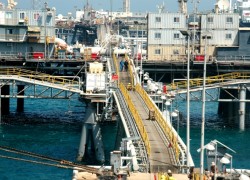
Reuters reports that Iraq has sweetened the terms for oil contract buyers and is becoming more competitive on pricing.
Oil Minister Abdul Kareem Luaibi [Elaibi], who met customers in Vienna last month on the sidelines of the OPEC meeting, told the news agency:
“We were keen that I personally meet all the companies that buy Iraqi crude oil and hear their complaints directly from them … After considering these problems in detail, we decided to improve the contractual terms and conditions as well as enhance the competitiveness of Iraq’s crude oil.“
Buyers had expressed concerns over the higher prices and the variable quality of Iraqi oil.
Customers said one change the Iraqis have offered to make is to demurrage – money to be paid in the event of a cargo loading outside the agreed period – which buyers said was costing them a fortune.
“They heard loud and clear that the demurrage payment, or lack thereof and huge delays to what was agreed, was affecting business,” said a source at one company which buys Iraqi crude.
The customer, though, was “not overwhelmed” by the offer and a second buyer, involved in an oilfield project in southern Iraq, plans to visit Baghdad to follow up with the Iraqi State Oil Marketing Organization (SOMO).
“So far, the changes are really not significant for us,” said the second buyer. “We’re still in discussions.”
But Iraq also has another problem with the variable quality of the Basra Light and Kirkuk crude streams, due to the erratic flow of Kurdistan oil into the Kirkuk stream and the start-up of new fields in the south.
Changes in the crude’s sulphur content and API gravity – a measure of its weight – affect its value and can cause processing problems for refineries configured for a certain gravity and sulphur level.
Iraq has managed to stablize the API of Basra Light at around 30 degrees, an Iraqi official said. A regular buyer of the grade confirmed the change.
Keeping the quality of Kirkuk stable will be more of a challenge after the Kurdistan Regional Government (KRG) halted shipments through the Baghdad-controlled Iraq-Turkey pipeline in December, due to the long-running feud over contracts and payments.
Luaibi told Reuters a subsea pipeline in the Gulf would be opened soon which would allow two offshore Single Point Moorings (SPMs) to load simultaneously, boosting capacity in the south to above 2.6 million bpd from about 2.3 million bpd now.
Iraq is also addressing concerns about high official selling prices for its Basra Light and Kirkuk crude oils, buyers say.
Despite the increasing supply, Basra Light has been more expensive for Asian buyers than a rival crude from Saudi Arabia, Arab Medium.
For February 2013, however, Iraq chose to raise its Basra Light price to Asia by 5 cents a barrel, while Saudi Arabia increased the prices of its Arab Light, Medium and Heavy crude to customers in the East by 15-30 cents.
“Most importantly, they recently have become more competitive with their prices compared to the usual following of the Saudi formulae,” said a long-time buyer of Iraqi oil.
A second customer felt the Iraqis could do more. “A little bit but not enough. They need to get more realistic,” the buyer said.





